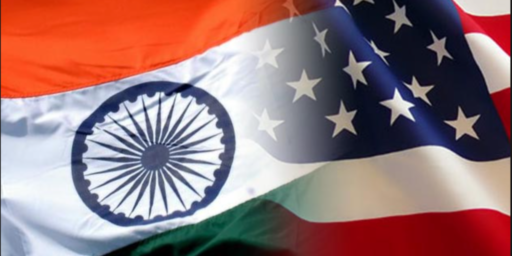Pakistanis and Indians Hired to Cook in Iraq
Toward the end of a column that points out legitimate flaws in our Iraq policy, George Will cites his WaPo colleague Rajiv Chandrasekaran’s book Imperial Life in the Emerald City: Inside Iraq’s Green Zone.
Halliburton, writes Chandrasekaran, hired Pakistanis and Indians, but no Iraqis, for kitchen work. “Nobody ever explained why, but everyone knew. They could poison the food.”
Uh, no.
Halliburton hired Pakistanis and Indians for food service work (and truck driving) in Saudi Arabia and Kuwait during Operation Desert Storm, too. I suspect they did the same thing in northern Iraq during Operation Provide Comfort.
Indeed, I suspect that Pakistanis and Indians were doing most of the work in Iraqi restaurants under Saddam Hussein’s watch, as they do throughout the Arab world. That type of work was considered beneath men in Bedouin culture and the disdain for manual labor is widespread in the Arab world and many other traditional societies. Even in India, that work is typically reserved for the down castes.
While no such cultural stigma attaches to manual labor in the West, those with the means to do so have long hired out housecleaning and yard work. Those services were disproportionately done by blacks until recent years, when Hispanics, especially illegal immigrants, have nudged them aside.
In recent decades, oil money has made it very easy for Arab states to farm out their scut work to foreigners rather than low status natives. Indians and Pakistanis are the natural choice, given their geographic proximity and abundance of poor people willing to work for modest wages.






Exactly right, James. The majority of people working base services when I was in Oman during OIF were from Indonesia.
In fact, this is my main reason for being against a ‘guest worker’ immigration plan… I believe it would implement basically the same sort of ‘caste-like’ system here in America, and I just have a gut reaction that such a thing is damaging to the society that tries it… To me, it inherently lowers the value of other human beings.
I understand and appreciate Legion’s fear of a caste system. It is an awful thing that should be gone from the world.
However, I believe we know better here. Let’s hope we do anyway.
“Indeed, I suspect that Pakistanis and Indians were doing most of the work in Iraqi restaurants under Saddam Hussein’s watch”
I suspect you are largely wrong. There are a lot of Indians working in the other Gulf countries. However even prior to 1991, the number of such workers in Iraq was small and was largely oil field workers and the like, and not restaurant workers. I would guess it shrank even further after that. I did not hear of any widespread evacuation of Indians in Iraq prior to the war, so that leads me to believe that there were very small numbers there, and most were probably professionals working in the oil industry.
I don’t think Saddam’s government ever encouraged migrant laborers from India or Pakistan (being a dictator, he was probably very concerned about controlling them). Unlike the other Gulf countries, which seem to be perfectly happy to farm out a lot of work, even high end technical and managerial work, to outsiders, Iraq always (even pre Saddam) used locals as much as possible.
In any case, we know there are large pockets of poverty in Iraq. Your comparison with Kuwait or Oman is totally incorrect because those are much wealthier countries. If local Iraqis had been employed more in such projects (especially early on before the insurgency took full hold), we might have seen less of them flocking to the Mahdi Army or other militias.
And Iraqis generally seem to have done a lot of their